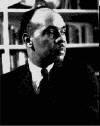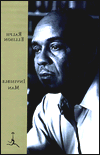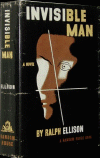
It Happened
in History!
(Go to
It Happened in History Archives)
|
In 1911, Lewis Ellison had come to Oklahoma from Chattanooga, Tennessee, to work as a construction foreman. His wife had grown up on a farm in White Oak, Georgia. When their son was only three, Lewis passed away unexpectedly, and Ida struggled to keep the wolves from the door. While growing up, young master Ellison showed a talent for music. He performed on the trumpet for friends and family. In high school, he joined the band and planned on becoming a professional musician. Two of his dearest friends were blues singer Jimmy Rushing and trumpeter Hot Lips Page.
With the
help of a music scholarship, Ellison entered Tuskegee Institute in Macon
County, Alabama in 1933. He hadn't enough money for train fare, so he
hitched his way by rail to the
school. Along the way, he passed through Decatur, Alabama, where the
Scottsboro trial in which several young black men were accused of raping a
white woman was underway. Ellison was nearly arrested simply for being
black, and the experience left an indelible
impression on him. From 1939 to 1944, Ellison published eight short stories. With each one, his writing grew in both eloquence and complexity. He stopped sharing his work with Wright--some say as a symbol of his growing literary maturity. Ellison said, "...our sensibilities were quite different; and, what I was hoping to achieve in fiction was something quite different from what he wanted to achieve."
Later that year, Ellison enrolled for two years in the Merchant Marines "to contribute to the war, but [not] be in a Jim Crow army." The next year, while on sick leave, he received a scholarship from the Rosenwald Foundation to write a novel. Affected by the experience of friends in the Army Air Corps, he planned to set his book in a Nazi Germany prisoner-of-war camp, in which the ranking officer is a Negro pilot who has a number of white pilots beneath him in rank. One day, while starting at his typewriter in a barn on a friend's Vermont farm, he typed the sentence, "I am an invisible man." He didn't know where it came from, but he wanted to pursue the idea, to find out what kind of a person would think of himself as invisible. The sentence turned into his first and most famous novel, Invisible Man (1953), which tells the life story of a disillusioned African-American man who has gone through a series of misadventures.
Invisible Man won the National Newspaper Publisher's Russwurm Award, the Chicago Defender's Award for its portrayal of the best in American Democracy, and the National Book Award. In choosing Ellison's work the best of the year, the Book Award judges declared, “In Invisible Man Ralph Ellison shows us how invisible we all are to each other. With a positive exuberance of narrative gifts, he has broken away from the conventions and patterns of the tight ‘well-made’ novel.” In accepting the award, Ellison worried that the judges were “rewarding my efforts rather than my not quite fully achieved attempt at a major novel.” Years later, in an interview for the Paris Review (Number 8), he repeated his fear that the novel was “not an important one,” adding, “I failed of eloquence.” But history would prove Ellison wrong. Decades later, the book would continue to be held in high esteem. In a Wilson Quarterly poll of professors of American literature conducted in 1978, Invisible Man was selected as the most important novel published in the United States since World War II.
By the time Ralph Waldo Ellison died in Harlem in 1994, he had completed more than 1,500 pages of the novel. The story spans almost 150 years and includes three plotlines and more than a dozen narrators. Ellison scholar John F. Callahan whittled the manuscript down to 900 pages and published it in 1999 under the title Juneteenth. The novel covers much of African-American history in the twentieth century while focusing on the story of a U.S. senator who was raised as a light-skinned black in rural Georgia. The book became a national bestseller.
Discover Ralph Ellison
Indulge
Yourself - Check Out Today's Best-Selling |
- HOME -


 "I am an
invisible man. No, I am not a spook like those who haunted Edgar Allen Poe;
nor am I one of your Hollywood-movie extoplasms. I am a man of substance,
of flesh and bone, fiber and liquids--and I might even be said to possess a
mind. I am invisible, understand, simply because people refuse to see me.
Like the bodiless heads you see sometimes in circus sideshows, it is as
though I have been surrounded by mirrors of hard, distorting glass. When
they approach me they see only my surroundings, themselves, or figments of
their imagination -- indeed, everything and anything except me." - Prologue
from Invisible Man
"I am an
invisible man. No, I am not a spook like those who haunted Edgar Allen Poe;
nor am I one of your Hollywood-movie extoplasms. I am a man of substance,
of flesh and bone, fiber and liquids--and I might even be said to possess a
mind. I am invisible, understand, simply because people refuse to see me.
Like the bodiless heads you see sometimes in circus sideshows, it is as
though I have been surrounded by mirrors of hard, distorting glass. When
they approach me they see only my surroundings, themselves, or figments of
their imagination -- indeed, everything and anything except me." - Prologue
from Invisible Man

